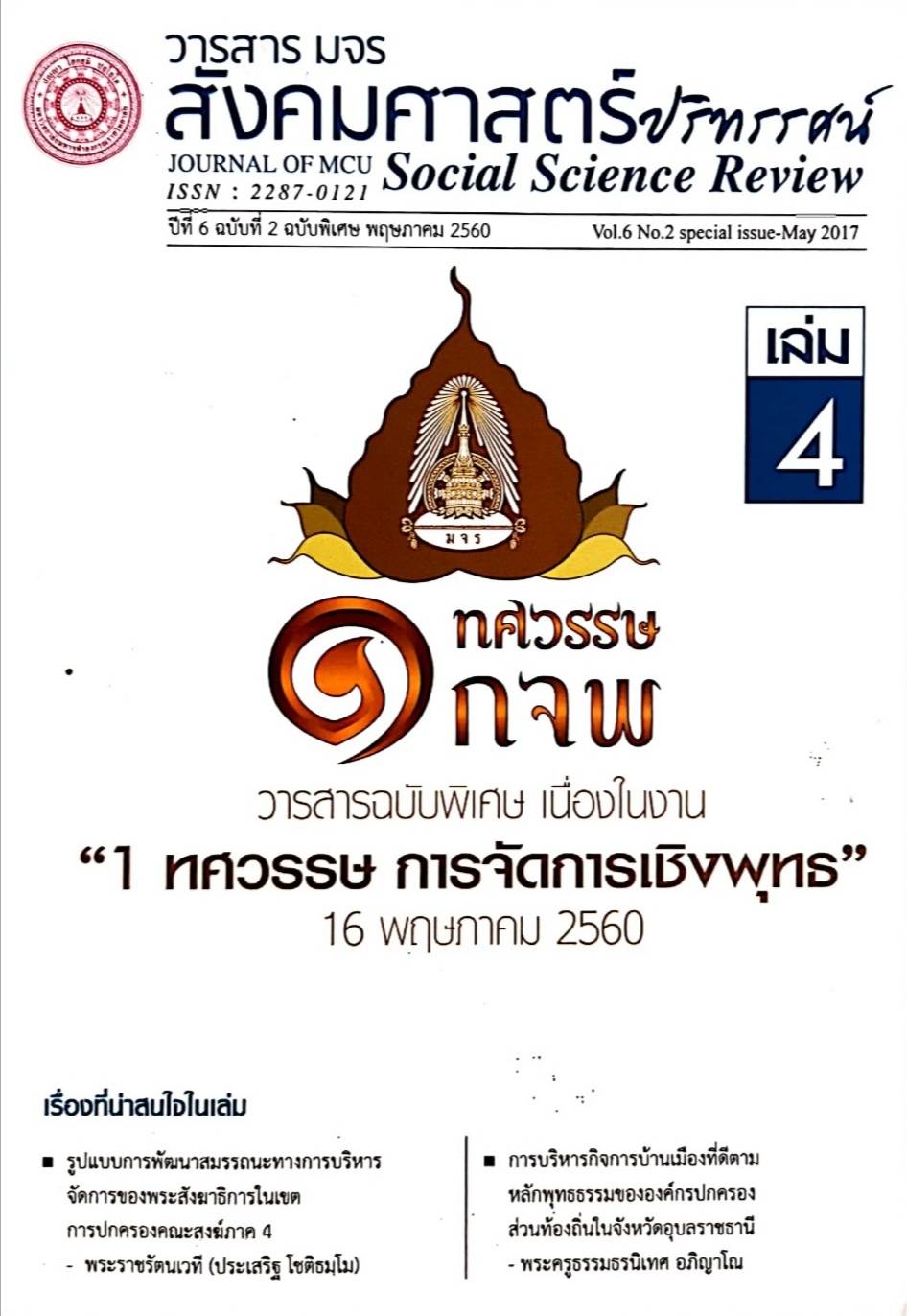รูปแบบการพัฒนาวัดให้เป็นศูนย์รวมจิตใจของประชาชนในจังหวัดสระบุรี
คำสำคัญ:
รูปแบบ, การพัฒนาวัด, ศูนย์รวมจิตใจบทคัดย่อ
การวิจัยครั้งนี้ มีวัตถุประสงค์เพื่อ 1) ศึกษาสภาพปัจจุบันในการพัฒนาวัดให้เป็นศูนย์รวม
จิตใจของประชาชนในจังหวัดสระบุรี 2) ศึกษาหลักการและแนวคิดเกี่ยวกับการพัฒนาวัดให้เป็น
ศูนย์รวมจิตใจของประชาชน และ 3) วิเคราะห์รูปแบบการพัฒนาวัดให้เป็นศูนย์รวมจิตใจของ
ประชาชนในจังหวัดสระบุรี
ระเบียบวิธีวิจัยเป็นการวิจัยเชิงคุณภาพ (Qualitative Research)เก็บข้อมูลภาคสนาม
(Field Study) จากพระสังฆาธิการในจังหวัดสระบุรีหัวหน้าหน่วยงานราชการในจังหวัดสระบุรี
ผู้บริหารสถานศึกษาในจังหวัดสระบุรีพุทธศาสนิกชนในจังหวัดสระบุรีและผู้เชี่ยวชาญทาง
พระพุทธศาสนาโดยการเลือกแบบเจาะจงตามลักษณะการเป็นตัวแทนของกลุ่มที่เหมาะสม สาหรับ
การสัมภาษณ์เชิงลึก (In-depth Interview)ผู้ให้ข้อมูลสาคัญ จานวน 26 รูป/คน ได้ใช้แบบ
สัมภาษณ์แบบมีโครงสร้าง (Structured Interview) เป็นเครื่องมือในการเก็บรวบรวมข้อมูล และ
การสนทนากลุ่มเฉพาะ (Focus Group Discussion) จานวน 10 รูป/คน ได้ใช้แบบบันทึกการ
สนทนากลุ่มเป็นเครื่องมือในการเก็บรวบรวมข้อมูล และวิเคราะห์ข้อมูลด้วยเทคนิคการวิเคราะห์
เนื้อหาประกอบบริบท(Content Analysis Technique)
ผลการวิจัยพบว่า
1. สภาพปัจจุบันในการพัฒนาวัดให้เป็นศูนย์รวมจิตใจของประชาชนในจังหวัดสระบุรี
ปัจจัยด้านบุคลากรหรือพระสงฆ์ ที่มีความรู้ความสามารถมากขึ้นในการเทศน์ ปัจจัยด้าน
งบประมาณ เพื่อการพัฒนาวัดให้สร้างสุข พัฒนาวัดให้มีความสะอาดบรรยากาศที่โล่ง โปร่งสบายและสะอาดตา สว่าง ปรับปรุงสภาพแวดล้อมของวัดให้มีความสงบร่มรื่น ด้านวัสดุอุปกรณ์ที่สร้างมี
มาตรฐาน มีกฎเกณฑ์ และด้านการจัดการที่มุ่งมั่นพัฒนาสร้างสุขให้พุทธศาสนานิกชน
2. แนวคิดตามบทบาทของวัด ได้แก่ 1) การเป็นสถานที่ศึกษา 2) การเป็นสถาน
สงเคราะห์ 3) การเป็นที่พักเดินทาง 4) การเป็นที่ไกล่เกลี่ยข้อพิพาท5) การเป็นศูนย์ศิลปวัฒนธรรม
6) การเป็นคลังพัสดุ และ 7) การเป็นศูนย์กลางการบริการ เพื่อพัฒนาประชาชนตามหลักไตรสิกขา
คือ 1) ศีล คือ ทาให้คนอยู่ในระเบียบวินัย 2) สมาธิ ทาให้จิตใจตั้งมั่นต่อสังคมและ 3) ปัญญา รอบรู้
ในปัญหาแก้ได้ด้วยสันติวิธี ไม่นิยมกาลัง จึงทาให้วัดเป็นศูนย์รวมจิตใจของชุมชนเกือบทุกด้าน
3. รูปแบบการพัฒนาวัดให้เป็นศูนย์รวมจิตใจของประชาชนในจังหวัดสระบุรี พบว่า (1)
ด้านบุคลากร พบว่า ด้านการส่งเสริมการศึกษา การศึกษามีอยู่ แต่ในวังกับวัดเท่านั้น แต่วัดกับ
พระสงฆ์เป็นฝ่ายใกล้ชิดกับประชาชนมากกว่า วัดและพระสงฆ์ก็เป็นผู้มีส่วนร่วมเป็นอย่างมาก
เพราะมีความพร้อมทางด้าน ทรัพยากรที่ตกทอดมา พระสงฆ์จึงยังเป็นผู้ให้การศึกษาแก่สังคม ตั้งแต่
ชาวบ้านทั่วไปจนถึงเจ้านาย และพระมหากษัตริย์ ด้านการเป็นสถานสงเคราะห์ ที่ให้การช่วยเหลือผู้
ประสบปัญหาชีวิตและคนยากจน เช่น การช่วยสงเคราะห์อนุเคราะห์บุตรหลานของชาวบ้านที่ยากจน
การสงเคราะห์สังคมในด้านต่างๆ การช่วยเหลือผู้ประสบภัยพิบัติต่างๆ ด้านอาหาร เสื้อผ้า ที่พัก
อาศัยชั่วคราว การให้ทุนการศึกษาการให้การสงเคราะห์ ด้านการเป็นที่พักคนเดินทาง พักอาศัยแก่
นักเรียน นักเรียนต่างท้องถิ่นที่มาศึกษาเรียนอยู่ในเมือง การให้ที่พักอาศัยแก่บุคคลที่มารักษาศีล
เช่น ชี หรือคนชรา คนทุพลภาพ การให้เช่าที่ดินในราคาถูกแก่ประชาชนที่ขัดสนปลูกบ้านพักอาศัย
ในการพัฒนาสังคมนั้น จาเป็นที่จะต้องรอบรู้เท่าทันการเปลี่ยนแปลงของสังคม เพื่อให้การทาหน้าที่
ของวัดและพระสงฆ์เป็นไป อย่างเหมาะสม ถูกต้อง และเกิดประโยชน์สูงสุด ด้านการเป็นสถานที่
ไกล่เกลี่ยข้อพิพาท พระพุทธศาสนาเป็นรากฐานสาคัญต่อการเมืองการปกครองที่จะให้มวลมนุษย์
อยู่ร่วมกันอย่างสันติสุขได้ โดยใช้หลักธรรมทางพระพุทธศาสนาเป็นหลักการ ความคิด และเป็น
แนวทางในการประพฤติปฏิบัติทั้งผู้ปกครองรัฐและประชาชนในรัฐ รวมทั้งการเผยแผ่
พระพุทธศาสนาไปทั่วโลก ด้านวัดเป็นศูนย์กลางศิลปวัฒนธรรม ความสาคัญของศิลปวัฒนธรรม
และภูมิปัญญาท้องถิ่นในฐานะเป็นมรดกทางสังคม ที่เกิดจากการประพฤติปฏิบัติร่วมกันเป็น
แนวทางเดียวกันอย่างต่อเนื่องของคนในสังคม ที่สืบทอดต่อเนื่องกันมาจากอดีตจนถึงปัจจุบัน ด้าน
วัดเป็นศูนย์กลางศิลปวัฒนธรรม ความสาคัญของศิลปวัฒนธรรมและภูมิปัญญาท้องถิ่นในฐานะ
เป็นมรดกทางสังคม ที่เกิดจากการประพฤติปฏิบัติร่วมกันเป็นแนวทางเดียวกันอย่างต่อเนื่องของคน
ในสังคม ที่สืบทอดต่อเนื่องกันมาจากอดีตจนถึงปัจจุบัน เป็นผู้อนุรักษ์สิ่งแวดล้อม
เอกสารอ้างอิง
Basic Core Curriculum for 1dt Grade and 4th Grade students at
Demonstration School of Rajabhat Suansunanta University (Research
Report). Funded by Rajabhat Suansunanata University,
Kornusa Srisuwan. (2552). Medical Science Curriculum Evaluation, Srinakarinvirote
University (Research Report). Bangkok: Srinakarinvirote University.
Vilawan Kongsadee. (2552). Factors Affecting Learning Achievement of 52 ID Coded
Students of Business Administration, Rajapruk College, Academic Year 2552
(Research Report). Funded by Research Fund of Research Center.
Nonthaburi: Rajapruk College.
Kittiyaphorn Choksawatphinyo. (2553). study Social Development Quality of live of
HIV people for people of the upper central region, Dissertation Graduate
School : MCU.
Somboon Thammalangkar. (2554). study the holistic well-being administration for
people of the upper central region, Dissertation Graduate School : MCU.
Natthayaphorn Keawpokpong. (2556). Study The Holistic Well-Being Administration
For People Of The Local Wishdom Of Changrai Province. Dissertation
Graduate School : MCU.
Pharmaha Suthit Arphakaor. (2553). Study The Holistic Well-Being Administration For
People Of The Upper Central Region And Buddhist Approach, Dissertation
Graduate School : MCU.
ดาวน์โหลด
เผยแพร่แล้ว
รูปแบบการอ้างอิง
ฉบับ
ประเภทบทความ
สัญญาอนุญาต
ลิขสิทธิ์ (c) 2020 วารสาร มจร สังคมศาสตร์ปริทรรศน์

อนุญาตภายใต้เงื่อนไข Creative Commons Attribution-NonCommercial-NoDerivatives 4.0 International License.
เพื่อให้เป็นไปตามกฎหมายลิขสิทธิ์ ผู้นิพนธ์ทุกท่านต้องลงลายมือชื่อในแบบฟอร์มใบมอบลิขสิทธิ์บทความให้แก่วารสารฯ พร้อมกับบทความต้นฉบับที่ได้แก้ไขครั้งสุดท้าย นอกจากนี้ ผู้นิพนธ์ทุกท่านต้องยืนยันว่าบทความต้นฉบับที่ส่งมาตีพิมพ์นั้น ได้ส่งมาตีพิมพ์เฉพาะในวารสาร มจร สังคมศาสตร์ปริทรรศน์ เพียงแห่งเดียวเท่านั้น หากมีการใช้ภาพหรือตารางหรือเนื้อหาอื่นๆ ของผู้นิพนธ์อื่นที่ปรากฏในสิ่งตีพิมพ์อื่นมาแล้ว ผู้นิพนธ์ต้องขออนุญาตเจ้าของลิขสิทธิ์ก่อน พร้อมทั้งแสดงหนังสือที่ได้รับการยินยอมต่อบรรณาธิการ ก่อนที่บทความจะได้รับการตีพิมพ์ หากไม่เป็นไปตามข้อกำหนดเบื้องต้น ทางวารสารจะถอดบทความของท่านออกโดยไม่มีข้อยกเว้นใดๆ ทั้งสิ้น





